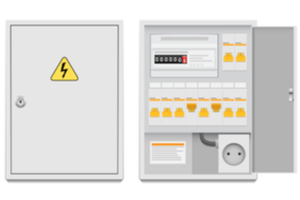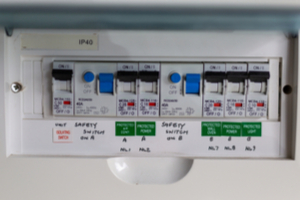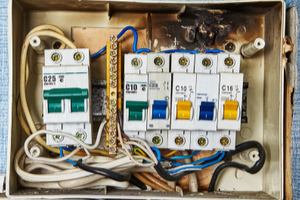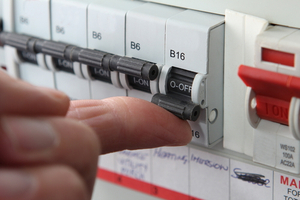If it’s time to get familiar with the most important unit in your house, then you’ve come to the right place. And no, we’re not exaggerating. Think about it. Without a fuse box, how could you spend those comfy nights in on the couch watching Netflix? Or, what about cooking that delicious stroganoff?
Picture a fuse box as the heart of your home, pumping electricity through wires which power your favourite devices and appliances. Whether you’ve experienced a power outage or your switchboard has tripped, chances are you would have come into contact with your fuse box. With this in mind, let’s unpack all the moving parts.
What is a fuse box?

Known as meter boxes in Australia, a fuse box is where your household’s main switch is located, as well as the circuit breakers and other wiring which distributes power to your home. Fuse boxes are usually found mounted on an exterior wall or inside the garage, and will be securely enclosed by a case. Some meter boxes can be locked, while others will have a latch to open.
What’s in a fuse box?
There are three main components found inside a fuse box: the main switch, switchboard or household circuits and circuit breakers. Each of these live parts have their own functions and purpose, which we’ll go into more detail below.
- Main switch: By flicking the main switch, this enables you to cut all electricity supply to your home or switching on electricity if supply has been tripped.
- Circuit breakers: These protect the fuses from excess electrical currents being distributed to your home by breaking the power supply with a spring-loaded switch.
- Switchboard: The switchboard is essentially the entire component that has the main switch as well as the circuit breakers. It also allows you to turn off electricity supply to certain areas of your home.
What is a switchboard?

Also referred to as a fuse board, switchboards are an essential unit that distribute electricity within the home. A modern switchboard will normally have a safety switch that protects a household in the event of the switchboard being overloaded with electricity. Think multiple appliances switched on at the same time, like a dishwasher, washing machine and clothes dryer.
Keep in mind that your electricity meter is different from your switchboard and may not be located inside your meter box. This is because your electricity meter needs to be accessible to contractors from your energy distributor when the time comes to read your meter.
How much does a switchboard cost to replace?
Replacing a switchboard can cost anywhere from $500 to $2,000, but will depend on individual circumstances, such as size and voltage capacity. These prices exclude installation costs, so it’s best to contact a local qualified electrician for an accurate quote based on your needs.
Compare Energy Prices
If you’ve found yourself asking how much it costs to replace a switchboard, you may also be looking to save on household energy costs. With electricity prices constantly moving, it’s important to review your plan and see how it stacks up against a bunch of others in market.
Here are some of the cheapest published deals from the retailers on our database that include a link to the retailer’s website for further details. These are products from referral partners†. These costs are based on the Ausgrid network in Sydney but prices may vary depending on your circumstances. This comparison assumes general energy usage of 3900kWh/year for a residential customer on a single rate tariff. Please use our comparison tool for a specific comparison in your area. Our database may not cover all deals in your area. As always, check all details of any plan directly with the retailer before making a purchase decision.
Here are some of the cheapest published deals from the retailers on our database that include a link to the retailer’s website for further details. These are products from referral partners†. These costs are based on the Citipower network in Melbourne but prices may vary depending on your circumstances. This comparison assumes general energy usage of 4000kWh/year for a residential customer on a single rate tariff. Please use our comparison tool for a specific comparison in your area. Our database may not cover all deals in your area. As always, check all details of any plan directly with the retailer before making a purchase decision.
Here are some of the cheapest published deals from the retailers on our database that include a link to the retailer’s website for further details. These are products from referral partners†. These costs are based on the Energex network in Brisbane but prices may vary depending on your circumstances. This comparison assumes general energy usage of 4600kWh/year for a residential customer on a single rate tariff. Please use our comparison tool for a specific comparison in your area. Our database may not cover all deals in your area. As always, check all details of any plan directly with the retailer before making a purchase decision.
Here are some of the cheapest published deals from the retailers on our database that include a link to the retailer’s website for further details. These are products from referral partners†. These costs are based on the SA Power network in Adelaide but prices may vary depending on your circumstances. This comparison assumes general energy usage of 4000kWh/year for a residential customer on a single rate tariff. Please use our comparison tool for a specific comparison in your area. Our database may not cover all deals in your area. As always, check all details of any plan directly with the retailer before making a purchase decision.
When does a switchboard need repairs or replacing?

Consider the factors below to determine if your switchboard requires attention.
- Fuses blow or trip when multiple appliances are in use
- Lights continuously flicker
- Fuse box has outdated ceramic fuses
- Circuit breakers trip frequently
- Cabling in switchboard overheat once overloaded
- Household appliances short circuiting
If you’re in any doubt, contact a licensed electrician to inspect your switchboard.
How long does it take to replace a switchboard?
The entire process of replacing a switchboard can take anywhere between two to eight hours depending on the location, installer and number of safety tests required.
Can I move my fuse box?
You can relocate a fuse box, but it isn’t easy. Relocating a fuse box is a costly exercise, usually setting you back up to $2,000. Due to the complicated wiring that will need to be taken out and replaced, you will definitely need a professional to do the job. You may need to chat with your electricity provider about the move, and some may even cover the re-connection for free.
Single Phase vs 3-Phase Power
The standard voltage of electricity entering a residential property is 230 to 240 volts, which is known as single phase power. For large homes with powerful appliances, chances are it’ll be connected to 3-phase power (400 to 415 volts). Single phase is connected to a home via an active and neutral wire, while 3-phase uses three active wires and one neutral wire.
Single phase is the most common connection to power in Australian homes as it has a smaller voltage capacity which accommodates the average electrical load. 3-phase is more commonly found in industrial spaces or commercial businesses where large appliances are in use, such as factory equipment and machinery.
Safety tips around fuse boxes

When dealing with anything electrical, it’s important to always follow safety precautions.
- Have safety switches installed, known as residual current devices (RCDs)
- Never touch damaged, frayed or unplugged wires
- If sparks or fire is visible, stay away from your fuse box and call a professional
- Contact a licensed electrician when repairing, replacing or installing a fuse box, including anything electrical related
If your home is older than 25 years, you’ll more than likely need to have your fuse box upgraded with circuit breakers. Not only will upgrading your meter box protect your home from overloads and shorts, it’ll also protect you or anybody else from electric shocks. Remember, your wellbeing isn’t worth the risk.
Is your electricity plan up to scratch?
While it’s best to leave the wiring in your fuse box to a qualified and licensed electrician, there is one thing you do have control over – your energy provider. If you haven’t compared electricity plans in a while, you could be paying too much for power. Give yourself a break and compare a wide range of energy deals for free below.
Image credits: Sebastian Studio/Shutterstock.com, Georgii Red/Shutterstock.com, ambimages/Shutterstock.com, Grigvovan/Shutterstock.com, Gary Perkin/Shutterstock.com


Share this article